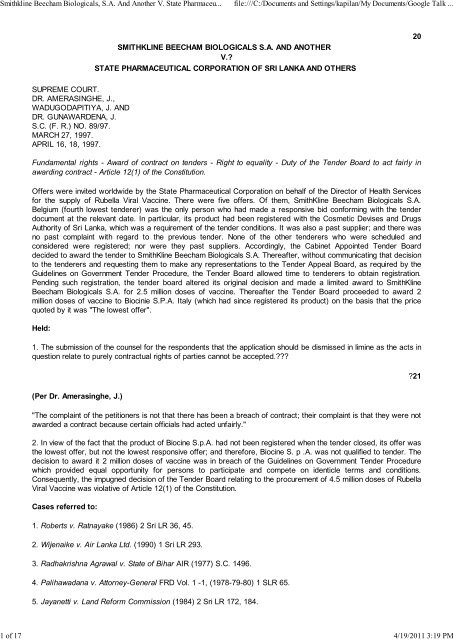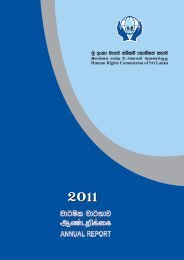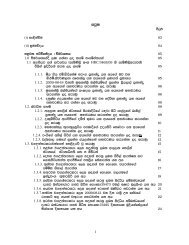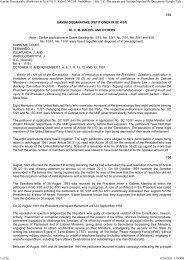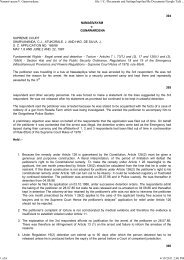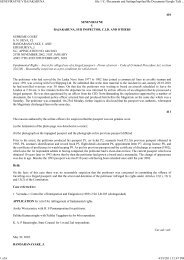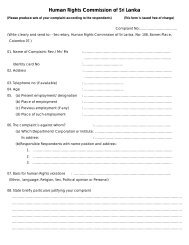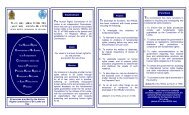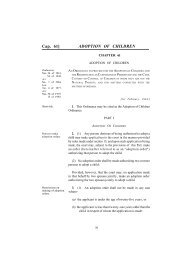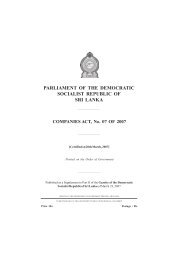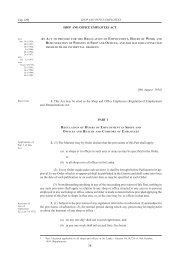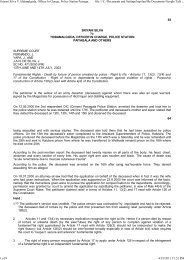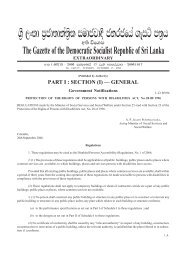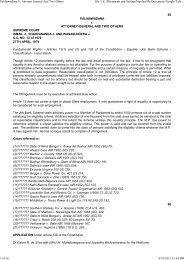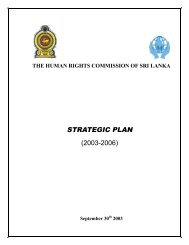Smithkline Beecham Biologic... - Human Rights Commission of Sri ...
Smithkline Beecham Biologic... - Human Rights Commission of Sri ...
Smithkline Beecham Biologic... - Human Rights Commission of Sri ...
You also want an ePaper? Increase the reach of your titles
YUMPU automatically turns print PDFs into web optimized ePapers that Google loves.
<strong>Smithkline</strong> <strong>Beecham</strong> <strong>Biologic</strong>als, S.A. And Another V. State Pharmaceu... file:///C:/Documents and Settings/kapilan/My Documents/Google Talk ...<br />
SUPREME COURT.<br />
DR. AMERASINGHE, J.,<br />
WADUGODAPITIYA, J. AND<br />
DR. GUNAWARDENA, J.<br />
S.C. (F. R.) NO. 89/97.<br />
MARCH 27, 1997.<br />
APRIL 16, 18, 1997.<br />
SMITHKLINE BEECHAM BIOLOGICALS S.A. AND ANOTHER<br />
V.?<br />
STATE PHARMACEUTICAL CORPORATION OF SRI LANKA AND OTHERS<br />
Fundamental rights - Award <strong>of</strong> contract on tenders - Right to equality - Duty <strong>of</strong> the Tender Board to act fairly in<br />
awarding contract - Article 12(1) <strong>of</strong> the Constitution.<br />
Offers were invited worldwide by the State Pharmaceutical Corporation on behalf <strong>of</strong> the Director <strong>of</strong> Health Services<br />
for the supply <strong>of</strong> Rubella Viral Vaccine. There were five <strong>of</strong>fers. Of them, SmithKline <strong>Beecham</strong> <strong>Biologic</strong>als S.A.<br />
Belgium (fourth lowest tenderer) was the only person who had made a responsive bid conforming with the tender<br />
document at the relevant date. In particular, its product had been registered with the Cosmetic Devises and Drugs<br />
Authority <strong>of</strong> <strong>Sri</strong> Lanka, which was a requirement <strong>of</strong> the tender conditions. It was also a past supplier; and there was<br />
no past complaint with regard to the previous tender. None <strong>of</strong> the other tenderers who were scheduled and<br />
considered were registered; nor were they past suppliers. Accordingly, the Cabinet Appointed Tender Board<br />
decided to award the tender to SmithKline <strong>Beecham</strong> <strong>Biologic</strong>als S.A. Thereafter, without communicating that decision<br />
to the tenderers and requesting them to make any representations to the Tender Appeal Board, as required by the<br />
Guidelines on Government Tender Procedure, the Tender Board allowed time to tenderers to obtain registration.<br />
Pending such registration, the tender board altered its original decision and made a limited award to SmithKline<br />
<strong>Beecham</strong> <strong>Biologic</strong>als S.A. for 2.5 million doses <strong>of</strong> vaccine. Thereafter the Tender Board proceeded to award 2<br />
million doses <strong>of</strong> vaccine to Biocinie S.P.A. Italy (which had since registered its product) on the basis that the price<br />
quoted by it was "The lowest <strong>of</strong>fer".<br />
Held:<br />
1. The submission <strong>of</strong> the counsel for the respondents that the application should be dismissed in limine as the acts in<br />
question relate to purely contractual rights <strong>of</strong> parties cannot be accepted.???<br />
(Per Dr. Amerasinghe, J.)<br />
"The complaint <strong>of</strong> the petitioners is not that there has been a breach <strong>of</strong> contract; their complaint is that they were not<br />
awarded a contract because certain <strong>of</strong>ficials had acted unfairly."<br />
2. In view <strong>of</strong> the fact that the product <strong>of</strong> Biocine S.p.A. had not been registered when the tender closed, its <strong>of</strong>fer was<br />
the lowest <strong>of</strong>fer, but not the lowest responsive <strong>of</strong>fer; and therefore, Biocine S. p .A. was not qualified to tender. The<br />
decision to award it 2 million doses <strong>of</strong> vaccine was in breach <strong>of</strong> the Guidelines on Government Tender Procedure<br />
which provided equal opportunity for persons to participate and compete on identicle terms and conditions.<br />
Consequently, the impugned decision <strong>of</strong> the Tender Board relating to the procurement <strong>of</strong> 4.5 million doses <strong>of</strong> Rubella<br />
Viral Vaccine was violative <strong>of</strong> Article 12(1) <strong>of</strong> the Constitution.<br />
Cases referred to:<br />
1. Roberts v. Ratnayake (1986) 2 <strong>Sri</strong> LR 36, 45.<br />
2. Wijenaike v. Air Lanka Ltd. (1990) 1 <strong>Sri</strong> LR 293.<br />
3. Radhakrishna Agrawal v. State <strong>of</strong> Bihar AIR (1977) S.C. 1496.<br />
4. Palihawadana v. Attorney-General FRD Vol. 1 -1, (1978-79-80) 1 SLR 65.<br />
5. Jayanetti v. Land Reform <strong>Commission</strong> (1984) 2 <strong>Sri</strong> LR 172, 184.<br />
1 <strong>of</strong> 17 4/19/2011 3:19 PM<br />
20<br />
?21
<strong>Smithkline</strong> <strong>Beecham</strong> <strong>Biologic</strong>als, S.A. And Another V. State Pharmaceu... file:///C:/Documents and Settings/kapilan/My Documents/Google Talk ...<br />
6. <strong>Sri</strong>lekha Vidyarthi v. State <strong>of</strong> U. P. AIR (1991) S.C. 537, 550.<br />
7. F. C .I. v Kamdhenu Cattlefield Industries (1993) 1 S.C.C. 71.<br />
8. Mahabir Auto Stores v. Indian Oil Corporation AIR (1990) S.C. 1031.<br />
9 (a) Vitarelli v Seaton (1959) 359 US 535, 79 S. Ct 968 3 L. Ed. 2d 1012 (1959).<br />
9 (b).Kiriwanthe and Another v Navaratne and Another 1990 3 SLR 11 at 15.<br />
10. Roman Dayaran Shetty v. The International Authority <strong>of</strong> India and Others AIR (1979) S.C. 1628<br />
11. Barbier v. Connolly 113 U.S. 27 (1885).<br />
APPLICATION for relief for infringement <strong>of</strong> fundamental rights.<br />
Shibly Aziz, PC. with Nigel Hatch for the petitioner.<br />
Saleem Marso<strong>of</strong>, D.S.G. with Shavindra Fernando, acting. S.S.C. for the ?respondent.<br />
May 20, 1997.<br />
DR. AMERASINGHE, J.<br />
Cur. adv. vult.<br />
Offers were invited worldwide by the State Pharmaceutical Corporation, on behalf <strong>of</strong> the Director <strong>of</strong> Health Services,<br />
on the 14th<br />
<strong>of</strong> May 1996, inter alia, for the supply <strong>of</strong> Rubella Viral Vaccine. The Tender (DHS/27/6/97) closed on 3rd July 1996.<br />
The bids were opened on the 3rd <strong>of</strong> July 1996. Offers were received from (1) Hubut Pharmaceuticals Ltd. <strong>of</strong> China;<br />
(2) Institute <strong>of</strong> Immunology Croatia; (3) Serum Institute <strong>of</strong> India; (4) SmithKline <strong>Beecham</strong> <strong>Biologic</strong>als S.A. Belgium;<br />
(5) Biocine S.p.A. Italy. The <strong>of</strong>fers <strong>of</strong> (1) Institute <strong>of</strong> Immunology Croatia; (2) Biocine S.p.A. Italy; (3) Serum Institute<br />
<strong>of</strong> India; and (4) SmithKline <strong>Beecham</strong> <strong>Biologic</strong>als S.A., were scheduled and evaluated on the 12th <strong>of</strong> August 1996 by<br />
the Technical Evaluation Committee appointed by the Secretary to the Treasury. The Technical Evaluation<br />
Committee reported and recommended that each <strong>of</strong> the following, namely, The Institute <strong>of</strong> Immunology Croatia,<br />
Biocine S.p.A. Italy and the Serum Institute <strong>of</strong> India was "not registered, not a past supplier, not acceptable." The<br />
Committee stated that SmithKline and <strong>Beecham</strong> Belgium, was "Acceptable subject to supplying with cold chain<br />
monitors and renewal <strong>of</strong> registration in 1997." It was noted by the Committee that SmithKline <strong>Beecham</strong> <strong>Biologic</strong>als<br />
S.A. Belgium was (1) a registered (2) previous supplier, and (3) that there were no past complaints with regard to<br />
that tenderer.<br />
On the matter <strong>of</strong> specifications, the Committee made the following entry in respect <strong>of</strong> three <strong>of</strong> the suppliers, including<br />
SmithKline <strong>Beecham</strong> <strong>Biologic</strong>als S.A.: "Specs conform except details <strong>of</strong> cold chain monitors."<br />
The State Pharmaceutical Corporation on the 27th <strong>of</strong> August 1996 sought confirmation that the product Would be<br />
supplied with cold chain monitors. Confirmation was made on the 29th <strong>of</strong> August 1996 by SmithKline <strong>Beecham</strong><br />
<strong>Biologic</strong>als S.A. that cold chain monitors would accompany each shipping box.<br />
Since it was required <strong>of</strong> suppliers that the product should be registered under the Cosmetic Devices and Drugs Act,<br />
and the registration <strong>of</strong> the product <strong>of</strong> SmithKline <strong>Beecham</strong> <strong>Biologic</strong>als S.A. was valid only up to the 22nd <strong>of</strong> March<br />
1996, whereas the product was required to be supplied in January and in May 1977, SmithKline <strong>Beecham</strong><br />
<strong>Biologic</strong>als S.A. were required to renew the registration <strong>of</strong>?<br />
23<br />
their product. Accordingly, the registration was extended for five years from the 23rd <strong>of</strong> March 1997.<br />
The Cabinet Appointed Tender Board (CATB) on the 2nd. <strong>of</strong> September 1996 recorded the following:<br />
2 <strong>of</strong> 17 4/19/2011 3:19 PM<br />
22
<strong>Smithkline</strong> <strong>Beecham</strong> <strong>Biologic</strong>als, S.A. And Another V. State Pharmaceu... file:///C:/Documents and Settings/kapilan/My Documents/Google Talk ...<br />
"The Tender Board. after considering the T.E.C. recommendation decided to award the tender to SmithKline<br />
<strong>Beecham</strong> - Belgium the fourth lowest tendered for U.S. $ 990,000. The three parties that were lower viz - Messieurs<br />
Institute <strong>of</strong> Immunology Croatia, Biocine Italy and Serum Institute <strong>of</strong> India are not registered parties. The T.B. noted<br />
that SmithKline <strong>Beecham</strong> is registered up to March 1997."<br />
On November 1st 1996, the Managing Director <strong>of</strong> the State Pharmaceuticals Corporation wrote to Dr. Dudley<br />
Dissanayake, Secretary Ministry <strong>of</strong> Health, Highways & Social Services, the third respondent, with a copy to the<br />
Chairman <strong>of</strong> the State Pharmaceuticals Corporation and Advisor to the Cabinet Appointed Tender Board, the fifth<br />
respondent, as follows:<br />
"I would like to make the following suggestions with regard to two items due to be taken up at the Cabinet Appointed<br />
Tender Board. meeting, today.? ,<br />
PARACETAMOL TABLETS<br />
.......................................<br />
II. RUBELLA VACCINE -<br />
This refers to my letter dated 18.9.96 on Rubella Vaccine.. The earlier decision was to award to a particular<br />
Company to the value <strong>of</strong> approximately Rs. 54 Million. However, according to the schedule there were three other<br />
companies who had quoted much less, but unfortunately they are not registered. If one <strong>of</strong> them are (sic.) registered<br />
there will be a substantial amount <strong>of</strong> saving.<br />
24<br />
Therefore we have written to the CDDA asking for the registration status <strong>of</strong> these three companies. We have been<br />
informed that two companies have submitted their samples for testing and reports are awaited. Therefore Tender<br />
Board may consider to take this matter up at the next meeting within (sic.) next 2/3 weeks.<br />
I spoke to Dr. Samaranayaka - Director - Medical Supplies Division on the above two suggestions. These<br />
suggestions are acceptable to him"<br />
The Cabinet Appointed Tender Board recorded its decision as follows:<br />
"The T.B. recommends the tender <strong>of</strong> M/S SmithKline <strong>Beecham</strong> Belgium for 2.5 million doses to be delivered in<br />
January 1997 at U.S. $ (illegible) by the lowest acceptable tenderer and registered party. The T.B. considered the<br />
letter <strong>of</strong> M.D. S.P.C. dated 1/11/96. In the course <strong>of</strong> discussion it became apparent that a delay in placing orders<br />
could lead to stocks running out. Therefore M/S Smith Kline <strong>Beecham</strong>'s <strong>of</strong>fer is recommended. The T.B. also noted<br />
that there are 2 million more doses to be ordered in 1997. By that time it is hoped that more parties would be<br />
registered."????? '<br />
The <strong>of</strong>fers for the supply <strong>of</strong> the Rubella vaccine, lapsed on 3rd November 1996 upon the expiry <strong>of</strong> the 120-day<br />
period <strong>of</strong> validity stipulated in Tender Condition (6). In response to a request from the State Pharmaceutical<br />
Corporation dated the 12th <strong>of</strong> November 1996, SmithKline <strong>Beecham</strong> <strong>Biologic</strong>als S.A., the Serum Institute <strong>of</strong> India,<br />
and Biocine S.p.A. (the 7th respondent) confirmed the extensions <strong>of</strong> their <strong>of</strong>fers and bid-bonds on November 14th,<br />
November 13th and November 21st 1996, respectively.<br />
The State Pharmaceutical Corporation published the "World wide tender results <strong>of</strong> High Value items from 1.1.96 to<br />
30.9.96" in the Daily News <strong>of</strong> the 25th <strong>of</strong> November 1996. Among the 23 items listed, there is the following:<br />
Tender No.?? ?Item??? ?? ?Quantity? ?Supplier??? ?Value<br />
DHS/26/9/96? ?Rubella ??1.2??????? ? ?SmithKline?? ?USD 256,250 ?<br />
?Vaccine ?million?? ? ? <strong>Beecham</strong>???? ?SLR 13.43<br />
?Live ?????? ?vials ???? ?????<strong>Biologic</strong>als ? million<br />
? ? SA Belgium<br />
On the 3rd <strong>of</strong> December 1996, the Managing Director <strong>of</strong> the State Pharmaceutical Corporation sent the following<br />
"note" to the Cabinet Appointed Tender Board, with a copy to the Chairman <strong>of</strong> the Corporation:<br />
"Further to my letter to the Secretary dated December 2, 1996 and our submission to the Cabinet Appointed Tender<br />
Board dated December 5, 1996. Now the following two companies have registered:<br />
3 <strong>of</strong> 17 4/19/2011 3:19 PM<br />
25
<strong>Smithkline</strong> <strong>Beecham</strong> <strong>Biologic</strong>als, S.A. And Another V. State Pharmaceu... file:///C:/Documents and Settings/kapilan/My Documents/Google Talk ...<br />
1) Biocine S.P.A., Italy<br />
2) Serum Institute, India<br />
These two company's tenders are much lower than the 3rd lowest. However, none <strong>of</strong> the items <strong>of</strong> Biocine, Italy have<br />
been purchased in the past by us while Serum Institute, India is a past supplier for many vaccine types. Therefore I<br />
suggest to award:<br />
1) 25% (i.e. 1,125 million doses) as a sample order to Biocine, Italy<br />
2) 75% (i.e. 3,375 million doses) to be awarded to Serum Institute <strong>of</strong> India."<br />
The Cabinet Appointed Tender Board met on the 10th <strong>of</strong> December 1996. In recording its decision, it referred to its<br />
decision on the 2nd <strong>of</strong> September, the fact that it had met again on' the 1st <strong>of</strong> November to consider the letters <strong>of</strong><br />
the Managing Director <strong>of</strong> the State Pharmaceuticals Corporation to the Secretary /Health Dated 18.9.96 and 1.11.96<br />
and its decision on that date. The Cabinet Appointed Tender Board then stated as follows:<br />
26<br />
"At today's meeting (10.12.96) <strong>of</strong> the CATB it was revealed that the CATB recommendations <strong>of</strong> 2.9.96 and 1.11.96<br />
have not gone up to Cabinet. As a result they were confronted with the matters mentioned in the note by MD/SPC to<br />
the CATB dated 9.12.1996. Under the present circumstances and given the fact that two other parties are now<br />
registered, CATB recommends that an award <strong>of</strong> 2.0 million doses be made to Biocine, Italy, the price being the<br />
lowest responsive <strong>of</strong>fer.<br />
Only 2.0 million doses is being recommended in this instance as. Biocine, Italy is a new supplier. This is<br />
recommended on the basis that each consignment would be suitably tested before despatch to hospitals.<br />
If supplies <strong>of</strong> this vaccine are timely and in order and complied with quality assurance tests, CATB recommends that<br />
the balance quantity (2.5 million doses) should also be awarded to Biocine, Italy."<br />
It is stated in the Preface to the Guidelines on Government Tender Procedure that they were designed, inter alia,<br />
"To keep the process fully transparent and honest." Paragraph 2 (h) <strong>of</strong> Part I <strong>of</strong> the Guidelines states that the<br />
Tender process should ensure transparency. Transparency requires at least that Tenderers should be informed <strong>of</strong><br />
decisions so that they might see what had been decided and have the opportunity <strong>of</strong> demonstrating why the decision<br />
was incorrect. And so, paragraph 136 <strong>of</strong> Part I <strong>of</strong> the Guidelines requires the Secretary to the Ministry concerned,<br />
within one week <strong>of</strong> the determination <strong>of</strong> a Cabinet Appointed Tender Board to inform in writing, all Tenderers who<br />
responded to the Tender Call, the intention to award the Tender to the successful Tenderer and request that if there<br />
are representations to be made against the determination, such appeals should be submitted in writing to the Tender<br />
Appeal Board with a copy to the Ministry concerned.<br />
The Secretary to the Ministry concerned did not comply with the requirements <strong>of</strong> paragraph 136 <strong>of</strong> Part I <strong>of</strong> the<br />
Guidelines. When SmithKline <strong>Beecham</strong> <strong>Biologic</strong>als S.A wrote a letter dated the 13th <strong>of</strong> December 1996 to the<br />
Chairman <strong>of</strong> the Tender Board C/o the State<br />
27<br />
Pharmaceutical Corporation stating that the firm was awaiting a communication <strong>of</strong> the decision <strong>of</strong> the Tender Board,<br />
there was no response to that letter.<br />
SmithKline <strong>Beecham</strong> <strong>Biologic</strong>als S.A. became aware <strong>of</strong> the latest decision <strong>of</strong> the Cabinet Appointed Tender Board,<br />
as they say in their letter dated the 22nd <strong>of</strong> January 1997 and in paragraph 14 <strong>of</strong> the affidavit <strong>of</strong> the Managing<br />
Director <strong>of</strong> SmithKline <strong>Beecham</strong> Mackwoods Ltd, through "highly placed <strong>of</strong>ficials"/ "senior <strong>of</strong>ficials <strong>of</strong> the 1st<br />
respondent corporation." They then wrote to the Chairman <strong>of</strong> the Cabinet Appointed Tender Board C/o The State<br />
Pharmaceuticals Corporation on the 22nd <strong>of</strong> January 1997 alleging that Biocine S.P.A. had failed to comply with the<br />
"fundamental and mandatory requirements <strong>of</strong> the tender conditions", and warned that, unless there was confirmation<br />
that SmithKline <strong>Beecham</strong> <strong>Biologic</strong>als S.A. would be awarded the contract, it would be compelled to take legal action.<br />
There was no reply to that letter.<br />
The duty <strong>of</strong> the Secretary was, in terms <strong>of</strong> paragraph 136 <strong>of</strong> the Guidelines, to inform tenderers that if there were<br />
representations to be made against the decision <strong>of</strong> the Tender Board, they should be submitted to the Tender<br />
Appeal Board. The Secretary did not do so. In the circumstances, the letter, which contained representations made<br />
against the determination <strong>of</strong> the Tender Board, ought to have been forwarded by him to the Tender Appeal Board,<br />
so that in terms <strong>of</strong> paragraph 138 the Cabinet could have been informed <strong>of</strong> the decision <strong>of</strong> the Appeal Board. These<br />
4 <strong>of</strong> 17 4/19/2011 3:19 PM
<strong>Smithkline</strong> <strong>Beecham</strong> <strong>Biologic</strong>als, S.A. And Another V. State Pharmaceu... file:///C:/Documents and Settings/kapilan/My Documents/Google Talk ...<br />
matters were not mentioned in the Cabinet Memorandum dated the 28th <strong>of</strong> January 1997 which has been produced<br />
in evidence by Mr. M. D. D. Pieris, the Chairman <strong>of</strong> the Cabinet Appointed Tender Board and the 2nd respondent in<br />
the matter before us. (See paragraph 14 (n) <strong>of</strong> his affidavit dated 5th March 1997).<br />
In the Memorandum to Cabinet, the Hon. Minister <strong>of</strong> Health, Highways and Social Services stated that he concurred<br />
with the recommendation <strong>of</strong> the Cabinet Appointed Tender Board and recommended that Cabinet Approval be<br />
granted to award 2.0 million doses <strong>of</strong> Rubella Viral Vaccine to M/S Biocine Italy at a total cost <strong>of</strong> U.S.$ 360,000; SL<br />
Rs. 19,923,300/00. "Also to award balance <strong>of</strong> 2.45 million Rubella Viral Vaccine to same supplier if supplies <strong>of</strong> 2.0<br />
million<br />
28<br />
doses Vaccines are timely and in order and complied with quality assurance tests at a total cost <strong>of</strong> US $ 450,000 SL<br />
Rs. 24,904,125/00.<br />
On the 29th <strong>of</strong> January 1997 SmithKline <strong>Beecham</strong> <strong>Biologic</strong>als S.A. and SmithKline <strong>Beecham</strong> Mackwoods Ltd. filed a<br />
petition in this Court alleging the infringement <strong>of</strong> their fundamental rights guaranteed by Article 12 and/or Article 12(2)<br />
<strong>of</strong> the Constitution. On the 30th <strong>of</strong> January 1997 the Court granted the petitioners leave to proceed for the alleged<br />
violation <strong>of</strong> Article 12 (1) <strong>of</strong> the Constitution. The Court issued interim orders restraining the import <strong>of</strong> the Rubella<br />
Vaccine from Biocine S.p.A. and restraining the respondents from taking any steps to prevent SmithKline <strong>Beecham</strong><br />
<strong>Biologic</strong>als S.A. being awarded the contract for the supply <strong>of</strong> the Vaccine in terms <strong>of</strong> prayers 'g' , and 'h' <strong>of</strong> the<br />
petition, which orders were extended pending the final hearing and determination <strong>of</strong> this matter.<br />
Learned Counsel for the respondents submitted that the application should be dismissed in limine, since the acts in<br />
question did not constitute 'administrative' or 'executive' action "as they relate to purely contractual rights <strong>of</strong> parties".<br />
He submitted that only an infringement <strong>of</strong> a fundamental right can be redressed through an application made under<br />
Article 126 <strong>of</strong> the Constitution. In support <strong>of</strong> his submission learned counsel cited Roberts v. Ratnayake (1) : at p 45.<br />
" ... where the rights and obligations <strong>of</strong> parties to such agreement have to be determined according to the ordinary<br />
law <strong>of</strong> contract, then even the State has to be treated in the same way as any other ordinary party ... where the<br />
rights and obligations <strong>of</strong> the parties to such a contract fall to be determined by the ordinary law <strong>of</strong> contract, then the<br />
provisions <strong>of</strong> Article 12 (1) <strong>of</strong> the Constitution have no application, and cannot be invoked."<br />
The decision in Roberts (supra) was followed in Wijenaike v. Air Lanka Ltd. and Other (2) at p. 293. Wijenaike also<br />
followed the view expressed in certain Indian decisions which had held that, although acts <strong>of</strong> the State at the<br />
threshold stage or at the stage <strong>of</strong> granting a contract would attract the constitutional guarantees <strong>of</strong> equality and<br />
equal protection <strong>of</strong> the law, yet, where there was a contract in force, Article 12 would apply only if the rights and<br />
liabilities were statutory: e.g. see Radhakrishna Agrawal v. State <strong>of</strong> Bihar (3) .<br />
Article 12(1) <strong>of</strong> the Constitution states that "All persons are equal before the law and are entitled to the equal<br />
protection <strong>of</strong> the law". With great respect, I am unable to accept the view that "law" in Article 12 (1) is confined to<br />
enactments <strong>of</strong> Parliament: In my view "law" includes regulations, rules, directions, instructions, guidelines and<br />
schemes that are designed to guide public authorities. If they contain provisions that are impermissible in terms <strong>of</strong><br />
the provisions <strong>of</strong> Article 12(1), or if in their application the guarantees <strong>of</strong> Article 12(1) are violated, they must be<br />
declared to be unconstitutional: This Court has consistently proceeded on that basis from the time <strong>of</strong> Palhihawadana<br />
v. Attorney- General (3) See also Jayanetti v. Land Reform <strong>Commission</strong> (5) at p. 184. I am also unable to agree with<br />
the view that a distinction should be drawn between cases in which there is a contract and those in which the matter<br />
is at a thereshold stage or some stage before the making <strong>of</strong> the contract: In my view, where there is a breach <strong>of</strong><br />
contract and a breach <strong>of</strong> Article 12 (1) brought about by the same set <strong>of</strong> facts and circumstances, it cannot be<br />
correctly said one <strong>of</strong> the remedies only can be availed <strong>of</strong>, the other being thereby extinguished; nor can it be<br />
correctly said that the aggrieved party must be confined to his remedy under the law <strong>of</strong> contract, unless there is a<br />
violation <strong>of</strong> statutory obligations: In <strong>Sri</strong>lekha Vidarthi v. State <strong>of</strong> UP A. L .R. (6) at p. 550, the Supreme Court <strong>of</strong> India<br />
considered contracts vis-a-vis Article 14 <strong>of</strong> the Indian Constitution, which corresponds with Article 12 <strong>of</strong> our<br />
Constitution. Verma, J (as he then was) speaking for the Court said:<br />
"The state cannot be attributed the split personality <strong>of</strong> Dr. Jekyll and Mr. Hyde in the contractual field so as to<br />
impress on it all the characteristics <strong>of</strong> the State at the threshold while making a contract requiring it to fulfill the<br />
obligation <strong>of</strong> Article 14 <strong>of</strong> the Constitution and thereafter permitting it to cast <strong>of</strong>f its garb <strong>of</strong> State to adorn the new<br />
robe <strong>of</strong> a private body during the subsistence <strong>of</strong> the contract enabling it to act arbitrarily subject only to the<br />
contractual obligations and remedies flowing from it. It is really the nature <strong>of</strong> its personality as State which is<br />
significant and must characterize all its actions, in whatever field, and not the nature <strong>of</strong> function, contractual or<br />
otherwise, which is decisive <strong>of</strong> the nature<br />
5 <strong>of</strong> 17 4/19/2011 3:19 PM<br />
29
<strong>Smithkline</strong> <strong>Beecham</strong> <strong>Biologic</strong>als, S.A. And Another V. State Pharmaceu... file:///C:/Documents and Settings/kapilan/My Documents/Google Talk ...<br />
<strong>of</strong> scrutiny permitted for examining the validity <strong>of</strong> its act. The requirement <strong>of</strong> Article 14 being the duty to act fairly,<br />
justly and reasonably, there is nothing which militates against the concept <strong>of</strong> requiring the State always to so act<br />
even in contractual matters. There is a basic difference between the acts <strong>of</strong> the State which must invariably be in<br />
public interest and those <strong>of</strong> a private individual, engaged in similar activities, being primarily for personal gain, which<br />
may or may not promote public interest. Viewed in this manner, in which we find no conceptual difficulty or<br />
anachronism, we find no reason why the requirement <strong>of</strong> Article 14 should not extend even in the sphere <strong>of</strong><br />
commercial matters for regulating the conduct <strong>of</strong> State activity."<br />
A similar view was taken by the Indian Supreme Court in F.C.I. v. Kamdhenu Cattlefield Industries (7) .<br />
The petitioners are before this Court complaining that they have been denied equal treatment and that they have<br />
been denied the equal protection <strong>of</strong> the taw guaranteed by Article 12 (1) <strong>of</strong> the Constitution. The complaint <strong>of</strong> the<br />
petitioners is not that there has been a breach <strong>of</strong> contract: their complaint is that they were not awarded a contract<br />
because certain <strong>of</strong>ficials had acted unfairly. Public functionaries must ensure that the guarantees <strong>of</strong> Article 12 <strong>of</strong> the<br />
Constitution are observed in the discharge <strong>of</strong> their duties and in the exercise <strong>of</strong> their powers, regardless <strong>of</strong> whether<br />
there is a statute or contract on which the rights <strong>of</strong> a petitioner may be based: See Mahabir Auto Stores v Indian Oil<br />
Corporation A. I R. (8) . For the reasons I have explained, the submission <strong>of</strong> learned counsel for the respondents that<br />
the petition must be rejected in limine cannot be accepted.<br />
Chapter XIII <strong>of</strong> the Financial Regulations and various circulars issued from time to time by the Ministry <strong>of</strong> Finance<br />
prescribe the procedures to be followed in obtaining goods and services by Government bodies. On the 30th <strong>of</strong><br />
September, 1996, The General Treasury issued a most important document: Guidelines on Government Tender<br />
Procedure. In the Preface to that document,<br />
the following observations are made by President <strong>of</strong> <strong>Sri</strong> Lanka and Minister <strong>of</strong> Finance and Planning:<br />
"Though the Tender procedure adopted at present is comprehensive, it has not prevented the occurrence <strong>of</strong><br />
irregularities. Due to its complexity, the finalization <strong>of</strong> tenders has taken unusually long periods. It is observed that<br />
our procedure takes the longest in this region.<br />
Therefore, the Government decided to prepare Guidelines on Tender Procedure, introducing amendments to the<br />
present procedure where necessary, in order to achieve the following objectives:<br />
1. To keep the process fully transparent and honest.<br />
2. To speed up the process.<br />
3. To obtain financially the most advantageous and qualitatively the best services and supplies for the country.<br />
At present it takes 24-36 months to bring a tender process to conclusion. This adversely affects development work<br />
and <strong>of</strong>ten leads to cost escalations.<br />
Constant allegations <strong>of</strong> corruption and lack <strong>of</strong> transparency have a debilitating effect on the Government<br />
administration and Government <strong>of</strong>ficers. The objective <strong>of</strong> formulating these guidelines is to eliminate the weaknesses<br />
by collating all the instructions, strengthening the procedures and assisting users by introducing features like check<br />
lists, standard documents etc.<br />
Therefore, this document attempts to reduce the time taken for the process to six (6) months, while keeping the<br />
whole process transparent and ensuring a level playing field to all tenderers ...<br />
32<br />
I hope these guidelines will help tenderers to <strong>of</strong>fer their services with the minimum <strong>of</strong> problems and delays. These<br />
guidelines will make the <strong>of</strong>ficer's task easier in completing the process expeditiously and accurately ...<br />
I sincerely hope that this document will serve to streamline the purchasing and selling procedures <strong>of</strong> Government, in<br />
order to achieve speed, efficiency and transparency and to provide a level playing-field for all citizens who participate<br />
in the economic process <strong>of</strong> the country."<br />
6 <strong>of</strong> 17 4/19/2011 3:19 PM<br />
30<br />
31
<strong>Smithkline</strong> <strong>Beecham</strong> <strong>Biologic</strong>als, S.A. And Another V. State Pharmaceu... file:///C:/Documents and Settings/kapilan/My Documents/Google Talk ...<br />
Paragraph 6 <strong>of</strong> Part 1 Chapter I <strong>of</strong> the Guidelines stipulates that "The Tender process should be concluded in the<br />
shortest possible time." As observed in the Preface to the Guidelines, delay "adversely affects development work<br />
and <strong>of</strong>ten leads to cost escalations," In the matter before us, yet another undersirable consequence has been<br />
highlighted, namely, the possibility that stocks <strong>of</strong> essential items may run out, a fact, as we have seen, that was<br />
noted by the Cabinet Appointed Tender Board. In paragraph 15 <strong>of</strong> the affidavit dated the 5th <strong>of</strong> March 1997, Mr. M.<br />
D. D. Pieris, who was Chairman <strong>of</strong> the Tender Board, states as follows: "... Rubella vaccine is administered on<br />
potential mothers to prevent the birth <strong>of</strong> deformed children ... the current annual requirement <strong>of</strong> the vaccine in <strong>Sri</strong><br />
Lanka is 4,500,000 doses whereas what is available in stock at present is only 600,000 doses. I state that in these<br />
circumstances, irreparable loss and damage would be caused to the Republic <strong>of</strong> <strong>Sri</strong> Lanka if the interim order<br />
already granted is extended any further." The interim order was granted to ensure that pending a determination <strong>of</strong><br />
whether the procedures adopted in dealing with tender DHS/27/6/97 were in violation <strong>of</strong> the Constitution, the<br />
procurement <strong>of</strong> the vaccine under that tender would be suspended. Any damage that might be caused by a shortage<br />
<strong>of</strong> stocks is referable to the failure <strong>of</strong> the Tender Board and certain <strong>of</strong>ficials to adhere to the procedures prescribed<br />
by the Government designed, inter alia, to eliminate delays.<br />
In the matter before us, the process started when the Secretary <strong>of</strong> the Cabinet <strong>of</strong> Ministers on the 6th <strong>of</strong> March<br />
1996 informed<br />
the Secretary <strong>of</strong> the Ministry <strong>of</strong> Health, Highways and Social Services that Her Excellency the President had<br />
approved the appointment <strong>of</strong> the Tender Board to determine the procurement <strong>of</strong> pharmaceuticals for the State<br />
Pharamaceutical Corporation in 1996. However, it was not brought to a finality. The Cabinet Appointed Tender<br />
Board,, accepting the recommendations <strong>of</strong> the Technical Evaluation Committee, made a decision on the 2nd <strong>of</strong><br />
September 1996: However, the Secretary <strong>of</strong> the Ministry <strong>of</strong> Health neither took action to pursue residual action for<br />
the completion <strong>of</strong> the tender award, nor did he inform tenderers <strong>of</strong> the decision that had been made, nor was a<br />
Cabinet Memorandum submitted under the hand <strong>of</strong> the Minister, forwarding the reports <strong>of</strong> the Tender Board and the<br />
Technical Evaluation Committee with the recommendations <strong>of</strong> the Minister.<br />
In my view, it was the failure <strong>of</strong> the Secretary <strong>of</strong> the Ministry <strong>of</strong> Health to take necessary action that not only caused<br />
the delay but also opened the door to the Cabinet Appointed Tender Board, eventually misdirecting itself, The<br />
Cabinet Appointed Tender Board, as we have seen, at its meeting on the 10th <strong>of</strong> December 1996 noted that at that<br />
meeting that "it was revealed that the CATB recommendations <strong>of</strong> 2.9.96 and 1.11.96 had not gone to Cabinet. As a<br />
result they were confonted with the matters mentioned in the note by MD/SPC to the CATB dated 9.12.1996.<br />
The emphasis is mine.<br />
In my view, the "confrontation" would have been avoided if the salutary directions given in paragraphs 135 and 136 <strong>of</strong><br />
the Guidelines had been followed:<br />
135. The determination <strong>of</strong> the Tender Award will be notified by the Chairman <strong>of</strong> the Tender Board to the Secretary <strong>of</strong><br />
the Ministry concerned or the Head <strong>of</strong> the Department concerned, as the case may be, who will thereafter pursue<br />
within one week residual action for the completion <strong>of</strong> the tender award.<br />
34<br />
136. In the case <strong>of</strong> A CATB, the Secretary to the Ministry concerned will, within one week <strong>of</strong> the determination<br />
inform in writing, all Tenderers who responded to the Tender Call, the intention to award the Tender to the<br />
successful Tenderer and request that if there are any representations to be made against the determination, such<br />
appeals should be submitted in writing to the Tender Appeal Board with a copy to the Secretary <strong>of</strong> the Ministry<br />
concerned. Simulataneously, a Cabinet Memorandum should be submitted under the hand <strong>of</strong> the Minister, forwarding<br />
the Reports <strong>of</strong> the Tender Board and the TEC, with the recommendation <strong>of</strong> the Minister.<br />
137. An appeal against an award should be lodged with the Appeal Board within one week <strong>of</strong> the intimation <strong>of</strong> the<br />
determination. The appeal should contain all materials required to support the averments and should be<br />
self-contained for the Board to arrive at a conclusion ...<br />
138. The Appeal Board shall report to the Cabinet, through the Secretary to the Cabinet within two weeks <strong>of</strong> an<br />
appeal being lodged"<br />
There was an appeal dated the 29th <strong>of</strong> November 1996 against the award <strong>of</strong> the contract to SmithKline & <strong>Beecham</strong><br />
<strong>Biologic</strong>als S.A. by the Country Manager <strong>of</strong> Biocine S.p.A. but this was not dealt with in the manner prescribed in<br />
paragraphs 136, 137 and 138 <strong>of</strong> the Guidelines: Biocine S.p.A. did succeed eventually, in so far as it became the<br />
tenderer recommended by the Minister acting on the recommendations <strong>of</strong> the Cabinet Appointed Tender Board but,<br />
7 <strong>of</strong> 17 4/19/2011 3:19 PM<br />
33
<strong>Smithkline</strong> <strong>Beecham</strong> <strong>Biologic</strong>als, S.A. And Another V. State Pharmaceu... file:///C:/Documents and Settings/kapilan/My Documents/Google Talk ...<br />
as we have seen, not because its appeal had been considered by a Tender Appeal Board whose decision had been<br />
reported to the Cabinet, as required by the Guidelines.<br />
The Chairman <strong>of</strong> the Cabinet Appointed Tender Board does not in his affidavit <strong>of</strong> the 17th <strong>of</strong> February 1997 state<br />
that either he or the Cabinet Appointed Tender Board were influenced by the fact that<br />
Government <strong>of</strong> <strong>Sri</strong> Lanka owed the State Pharmaceutical Corporation over As. 300 million on account <strong>of</strong> the supply<br />
<strong>of</strong> medical products with the result that the State Pharmaceutical Corporation had to borrow from Commercial Banks<br />
at the market rate <strong>of</strong> interest to maintain supplies <strong>of</strong> products. Nor does this appear as a stated reason for any <strong>of</strong><br />
the several decisions <strong>of</strong> the Cabinet Appointed Tender Board. However, in his second affidavit dated the 5th <strong>of</strong><br />
March 1997 the Chairman <strong>of</strong> the Cabinet Appointed Tender Board seeks to justify the decision made by the Tender<br />
Board on that ground. The Managing Director <strong>of</strong> the State Pharmaceutical does not advert to this matter in any <strong>of</strong><br />
the documents placed before us, although he does refer to the matter <strong>of</strong> savings. Cost, per se, is no doubt one <strong>of</strong><br />
the matters the Tender Board may have legitimately taken into account in arriving at its decision. However, the<br />
indebtedness <strong>of</strong> the State Pharmaceutical Corporation was another matter.<br />
Learned counsel for the respondents, whilst conceding that the provisions <strong>of</strong> the Guidelines had not been followed in<br />
the matter <strong>of</strong> submitting the recommendations to the Cabinet, submitted that the "omission is understandable as the<br />
Guidelines were issued only on or about 30th September." This can hardly be pleaded as an excuse, for at least by<br />
the time <strong>of</strong> the second decision on the 1st <strong>of</strong> November the Secretary concerned, as the chief accounting <strong>of</strong>ficer <strong>of</strong><br />
his Ministry, might reasonably have been expected to be acquainted with the contents <strong>of</strong> a document <strong>of</strong> prime<br />
importance to the proper discharge <strong>of</strong> his duties. Moreover, somewhat curiously, learned counsel for the<br />
respondents sought to justify the alteration <strong>of</strong> the views <strong>of</strong> the Cabiner Appointed Tender Board on the ground that<br />
since the first decision, the Guidelines had been issued, in terms <strong>of</strong> which "the foremost objective" <strong>of</strong> the tender<br />
process, when it relates to procurements, is the achievement <strong>of</strong> "maximum benefit to the Government" at the "least<br />
cost". Either the Secretary to the Ministry <strong>of</strong> Health was unaware <strong>of</strong> the Guidelines and, therefore, did not comply<br />
with them, or he was aware <strong>of</strong> them and, therefore, followed them. If the Tender Board was in fact guided by the<br />
so-called foremost objective <strong>of</strong> the tender process set out in the Guidelines, then the<br />
Secretary <strong>of</strong> the Ministry <strong>of</strong> Health, as a Member <strong>of</strong> the Cabinet Appointed Tender Board, was aware <strong>of</strong> the<br />
Guidelines. In paragraph 17 <strong>of</strong> his affidavit dated the 17th <strong>of</strong> February 1997, the Chairman <strong>of</strong> the Cabinet Approved<br />
Tender Board admits "that the tender board having considered all relevant matters ... recommended to the Cabinet<br />
<strong>of</strong> Ministers in terms <strong>of</strong> the Financial Regulations (1992) and Guidelines on Government Tender Procedure (1996)<br />
that the tender with respect to the Rubella Vaccine ahould be awarded to the 7th respondent In the circumstances,<br />
the failure on the part <strong>of</strong> the Secretary to the Ministry <strong>of</strong> Health, the third respondent, to comply with the Guidelines,<br />
is neither "understandable" nor excusable. Although he has been duly given notice, he has not filed an affidavit<br />
explaining his failure to comply with the prescribed procedures.<br />
Part I <strong>of</strong> the Guidelines deals with 'Government Procurement". Chapter I <strong>of</strong> that part deals with matters 'General".<br />
Paragraph 2 <strong>of</strong> that Chapter sets out what the "Tender process should ensure". They are stated to be as follows:<br />
(a) The least cost and maximum benefit to the Government.<br />
(b) Adherence to prescribed standards, rules and regulations.<br />
(c) Optimum Economic Advantage to the nation.<br />
(d) Maximum income in the disposal <strong>of</strong> assets or in granting <strong>of</strong> rights, concessions or exclusive benefits.<br />
(e) Equal opportunity for interested parties and persons to participate and compete on identical terms and conditions<br />
and emergence <strong>of</strong> competence and efficiency.<br />
(f) Expeditious execution <strong>of</strong> works and delivery <strong>of</strong> goods and supplies.<br />
(g) Compliance with local laws and international obligations.<br />
(h) Transparency and uniformity <strong>of</strong> the evaluation procedure.<br />
(i) Confidentiality <strong>of</strong> information provided by tenderers."<br />
8 <strong>of</strong> 17 4/19/2011 3:19 PM<br />
35<br />
36
<strong>Smithkline</strong> <strong>Beecham</strong> <strong>Biologic</strong>als, S.A. And Another V. State Pharmaceu... file:///C:/Documents and Settings/kapilan/My Documents/Google Talk ...<br />
The explanation <strong>of</strong> the respondents for the change <strong>of</strong> the decision <strong>of</strong> the Cabinet Appointed Tender Board is that it<br />
was compelled to do so by the Guidelines issued by the General Treasury in September 1996 since, as the learned<br />
Deputy Solicitor-General stated in his written submissions, "the foremost objective <strong>of</strong> the tender process when it<br />
relates to procurements is the achievement <strong>of</strong> 'maximum benefit to the Government' at the 'least cost'. He said that<br />
"the award in favour <strong>of</strong> the 7th respondent [biocine S.p.A.] would save the Government approximately Rupees<br />
9,937,800." In support <strong>of</strong> his submission, the learned Deputy Solicitor-General cited paragraph 14 (j) <strong>of</strong> the Affidavit,<br />
dated, 5th March 1997, <strong>of</strong> the second respondent who was the Chairman <strong>of</strong> the Cabinet Appointed Tender Board,<br />
wherein it was stated as follows:<br />
"... the tender board was conscious <strong>of</strong> the saving <strong>of</strong> approximately Rs. 9,937,800/- that could be made by accepting<br />
the tender <strong>of</strong> the 7th respondent, which was the lowest responsive <strong>of</strong>fer as against the <strong>of</strong>fer <strong>of</strong> the 1st petitioner."<br />
Admittedly, "The least cost and maximum benefit to the Government" is, as we have seen, placed by paragraph 2,<br />
Chapter 1, Part 1, <strong>of</strong> the Guidelines at the head <strong>of</strong> the list <strong>of</strong> what the "tender procedure should ensure". There is no<br />
evidence to support the view that the arrangement was on a hierarchical basis. Moreover, "the least cost" is not<br />
referred to as the ultimate or sole criterion: the criterion <strong>of</strong> "least cost" is subject to the criterion <strong>of</strong> "maximum benefit<br />
to the Government". If "maximum benefit to the government" meant "maximum financial benefit" in the sense <strong>of</strong><br />
saving rupees and cents, the reference to "maximum benefit to the Government" is tautologous. It is not: "Maximum<br />
benefit to the Government" refers to other, quite distinct, notions: obvously, the cheapest, as common experience<br />
shows, may not procure the best product. On the other hand, affordability is always an important consideration, and,<br />
in relation to some matters, perhaps, having regard to our limited resources, it may be appropriate to settle for<br />
something less desirable: but when any authority is dealing with a product concerned with the lives <strong>of</strong> the people,<br />
including the unborn citizens<br />
<strong>of</strong> <strong>Sri</strong> Lanka - as in the case <strong>of</strong> Rubella Vaccine which, as we have seen, according to the Chairman <strong>of</strong> the Tender<br />
Board, is to be injected into pregnant women to immunize their babies - would the Government compromise, may it<br />
gamble? Can it afford to do with less than the best available in terms <strong>of</strong> efficacy? Specifically, in this case, the<br />
Government acted with care: It appointed a Technical Evaluation Committee <strong>of</strong> four persons including Dr. T. A.<br />
Kulathilaka, Epidemiologist, Dr. (Mrs) N. Vithana, Virologist, and Dr. J. M. J. Munasinghe, Pharmacologist. Financial<br />
considerations were also to be considered, and so, the fourth member <strong>of</strong> the Committee nominated by the Secretary<br />
to the Treasury was Mr. M. Piyasena, Director Public Finance, General Treasury.<br />
Instead <strong>of</strong> stating that the objective <strong>of</strong> the Guidelines was to procure the cheapest services, the President and<br />
Minister <strong>of</strong> Finance, in the Preface to the Guidelines said that the prescribed procedure was "To obtain financially the<br />
most advantageous and qualitatively the best services and supplies for the country." What the "Tender procedure<br />
should ensure" is, inter alia, stated in the Guidelines to be "optimum Economic Advantage to the nation": I understand<br />
this to mean that the procedure relating to Government procurements should ensure the most favourable conditions<br />
for the advancement <strong>of</strong> the People by obtaining "financially the most advantageous and qualitatively the best supplies<br />
for the country." What is "financially the most advantageous and qualitatively the best supplies for the country" is<br />
pre-eminently a matter <strong>of</strong> policy that the Government, which is accountable to the People, must decide. In order to<br />
assist it in making an informed decision in the best interests <strong>of</strong> the People, the Government has, through the<br />
Financial Regulations, Circulars, and the Guidelines <strong>of</strong> 1996, laid down procedures to be followed in the matter <strong>of</strong><br />
Government procurements. Unless they are followed, the Government is liable to be misled in making its decisions.<br />
Therefore, there must be scrupulous adherence to procedures laid down by the Government. Part I Chapter I<br />
paragraph 2 (b) states that the tender process should ensure "adherence to prescribed standards, rules and<br />
regulations."<br />
39<br />
The respondents' claim that cost was the decisive factor is inexplicable in the light <strong>of</strong> the fact that in respect <strong>of</strong> oral<br />
polio vaccine (Tender No. DHS/R/VAC/96), which was awarded under the same world-wide tender (P 1) that dealt<br />
with the Rubella virus vaccine (Tender No. DHS/26/9/96), the contract was awarded to SmithKline <strong>Beecham</strong><br />
<strong>Biologic</strong>als SA despite the fact that its quotation was not the lowest. It was awarded the contract, as the<br />
Marketing Director <strong>of</strong> the 2nd Petitioner explains in paragraph 8 <strong>of</strong> his affidavit; because "inter alia it was the sole<br />
registered supplier there<strong>of</strong>".<br />
Answering the averments <strong>of</strong> the Marketing Director, the Chairman <strong>of</strong> the Tender Board, in paragraph 9 <strong>of</strong> his<br />
affidavit dated the 5th <strong>of</strong> March 1997, said: "I state that the question <strong>of</strong> registration <strong>of</strong> the product was only one <strong>of</strong><br />
the matters taken into consideration in awarding the 1st Petitioner the tender for the supply <strong>of</strong> vaccines in question,<br />
and I reiterate the averments <strong>of</strong> paragraph 13 and 16 <strong>of</strong> my affidavit dated 17th December 1996. I further state that<br />
9 <strong>of</strong> 17 4/19/2011 3:19 PM<br />
37<br />
38
<strong>Smithkline</strong> <strong>Beecham</strong> <strong>Biologic</strong>als, S.A. And Another V. State Pharmaceu... file:///C:/Documents and Settings/kapilan/My Documents/Google Talk ...<br />
in view <strong>of</strong> the financial difficulties now faced by the Government <strong>of</strong> <strong>Sri</strong> Lanka as well as the 1st Respondent<br />
Corporation, and the existing budgetary constraints, the price factor has become extremely important if not crucial in<br />
tender deliberations."<br />
As we have seen, Mr. M. Piyasena, the Director <strong>of</strong> Public Finance <strong>of</strong> the General Treasury, was a member <strong>of</strong> the<br />
Technical Evaluation Committee that recommended the award <strong>of</strong> the contract for the supply <strong>of</strong> Rubella vaccine to<br />
SmithKline <strong>Beecham</strong> <strong>Biologic</strong>als SA. Was he unaware <strong>of</strong> or unmindful <strong>of</strong> the financial difficulties referred to by the<br />
Chairman <strong>of</strong> the Cabinet Appointed Tender Board? Was Mr. V. S. Amaradasa, Director <strong>of</strong> Public Finance and a<br />
Member <strong>of</strong> the Cabinet Appointed Tender Board, the fourth respondent, unmindful or unaware <strong>of</strong> the financial<br />
difficulties referred to by the Chairman when the board decided on the 1st <strong>of</strong> November 1996 to award the contract<br />
to SmithKline <strong>Beecham</strong> <strong>Biologic</strong>als S.A.? Were the financial difficulties <strong>of</strong> the Government less when the Board<br />
decided in September and November 1996 to award the contract to SmithKline <strong>Beecham</strong> <strong>Biologic</strong>als SA than in<br />
December when it decided to award the contract to Biocine S.p.A.? What<br />
40<br />
was the explanation for the award <strong>of</strong> the previous contract on Tender No. DHS/26/9/96 for the supply <strong>of</strong> Rubella<br />
vaccine to SmithKline <strong>Beecham</strong> <strong>Biologic</strong>als S.A. in 1996 when it was the third lowest tenderer? It was not cost, but<br />
the fact it was the only registered responsive bidder.<br />
The Chairman <strong>of</strong> the Tender Board is unable to explain why the cost factor was decisive in the case <strong>of</strong> the Rubella<br />
vaccine but not in the case <strong>of</strong> the polio vaccine. The truth <strong>of</strong> the matter is that, being the only registered supplier, the<br />
only responsive bid for the polio vaccine was made by SmithKline <strong>Beecham</strong> <strong>Biologic</strong>als SA. However, although that<br />
supplier was also the only responsive bidder for the Rubella vaccine, the Tender Board, which had earlier correctly<br />
decided on the recommendations <strong>of</strong> the Technical Evaluation Committee to award the Tender to SmithKline<br />
<strong>Beecham</strong> <strong>Biologic</strong>als SA, later decided to award the contract to Biocine S.p.A. by misdirecting itself to believe that it<br />
was obliged or entitled to do so.<br />
Learned counsel for the respondents submitted that the Tender Board had "a clear discretion".<br />
Specifically, in the matter before us, he said, because:<br />
"the tender conditions marked P1 provide that<br />
The Tender Board reserves to itself the right without question to reject any or all <strong>of</strong>fers, the right to accept any part<br />
<strong>of</strong> a quotation, or order only such quantities and items as may be required."<br />
This provision reiterates and expressly reserves the basis 'power' (this term is used in the 'Hohfeldian sense) <strong>of</strong> the<br />
<strong>of</strong>feree recognized by Financial Regulation 697 (2) and Part I Chapter X paragraph 131 <strong>of</strong> the Guidelines ... to deal<br />
in whatever way he pleases with an <strong>of</strong>fer received by him under the law <strong>of</strong> contract."<br />
41<br />
If learned counsel for the respondents was right in asserting that a private individual may act as he pleases with an<br />
<strong>of</strong>fer, he is, in my view, mistaken in treating the State (including its agencies) as being on the same footing as a<br />
private individual. The State is not in the same position. In contractual matters, State action, such as the procurement<br />
<strong>of</strong> drugs for its health services, having as it does a public element, must be transparent, timely, and financially the<br />
most advantageous and qualitatively the best for the country: See the Preface to the Guidelines <strong>of</strong> 1996. In order to<br />
achieve those ends, it has been provided in paragraph 2 <strong>of</strong> Chapter 1, Part, I <strong>of</strong> the Guidelines certain things that<br />
the "tender process should ensure". They include "equal opportunity for interested parties and persons to participate<br />
and compete on identical terms and conditions": Paragraph 2 (e) <strong>of</strong> the Guidelines; and "transparency and<br />
uniformity <strong>of</strong> the evaluation procedure": paragraph 2(h) <strong>of</strong> the Guidelines.<br />
Recognizing its unique role and special responsibilities, the Government has prescribed procedures to be followed in<br />
the matter <strong>of</strong> procurement in its Financial Regulations and the Guidelines <strong>of</strong> 1996. It is stated in paragraph 2 (b) <strong>of</strong><br />
the Guidelines that the tender process should ensure "adherence to prescribed standards, rules and regulations".<br />
Paragraph 2(g) <strong>of</strong> the Guidelines requires that the tender process should ensure "compliance with local laws": this<br />
would, <strong>of</strong> course, include compliance with Article 12 <strong>of</strong> the Constitution that guarantees equality before the law and<br />
equal protection <strong>of</strong> the laws. In determining whether there was conformity with the procedures laid down for the<br />
purpose, infer alia, <strong>of</strong> ensuring equal protection <strong>of</strong> the law by providing, what was twice described in the Preface to<br />
the Guidelines as, "a level playing field", what is relevant are the norms laid down by the State. The Financial<br />
Regulations provide in regulation 697 that<br />
(1) ..............<br />
10 <strong>of</strong> 17 4/19/2011 3:19 PM
<strong>Smithkline</strong> <strong>Beecham</strong> <strong>Biologic</strong>als, S.A. And Another V. State Pharmaceu... file:///C:/Documents and Settings/kapilan/My Documents/Google Talk ...<br />
(2)??????? The Board shall have power<br />
(a) To accept any tender, or portion <strong>of</strong> a tender;<br />
(b) To accept portions <strong>of</strong> more than one tender;<br />
(c) To reject all or any tenders;<br />
(d)??????? ...????????<br />
(e) ...???<br />
Tender Board shall, in every case, record the reasons for its decision.<br />
(3) ......<br />
(4)??????? Tender Board should compare tenders received with departmental cost estimates. Tenders which are<br />
considerably higher than the departmental estimate should normally be rejected. If the tenders are all excessively<br />
high, action should be taken under (2) (e) above [i.e. direct that fresh tenders be called for].<br />
(5) By and large a Tender Board should accept the lowest evaluated tender ... which satisfies all conditions,<br />
specifications etc. <strong>of</strong> tender; and except with the ... approval <strong>of</strong> the Cabinet in the case <strong>of</strong> tenders in excess <strong>of</strong> Rs.<br />
5,000,000 in value no tender other than the lowest ... should be accepted; and that too only if such lowest ... tender<br />
satisfies all requirements.<br />
(6)??????? All tenders which are not in conformity with the stipulated specifications and conditions <strong>of</strong> tender should<br />
be rejected; but a Tender Board is not precluded from accepting a tender, if<br />
(a) the specifications are better than those prescribed;<br />
(b) the specifications or conditions <strong>of</strong>fered conform substantially to those in the tender documents and vary only in<br />
minor details.<br />
(7)??????? If negotiations in regard to the variation <strong>of</strong> any conditions or specifications, or in regard to any other<br />
matter pertinent to the final adjudication have to be conducted after the tenders have been opened, the Tender<br />
Board should conduct such negotiation<br />
only after notice to all the tenderers. A full record <strong>of</strong> all such negotiations should be maintained. The final adjudication<br />
following on such negotiation should not be made by the Tender Board without the approval <strong>of</strong> the appropriate<br />
authority under FR. 799.<br />
(8) ..."<br />
It is evident from the foregoing provisions <strong>of</strong> the Financial Regulations that, although a Tender Board does have very<br />
wide powers, it does not have uncontrolled, and unrestricted powers. It cannot, for instance, accept any tender that<br />
fails to conform substantially to the specifications and conditions <strong>of</strong> the Tender documents.<br />
The Guidelines provide as follows in Part I Chapter X:<br />
"131. The Tender Board shall have power to:<br />
(a) accept any tender, or portion <strong>of</strong> a tender;<br />
(b) accept portions <strong>of</strong> more than one tender;<br />
(c) reject all or any tenders;<br />
(d) direct that fresh tenders be called for<br />
(e) ...<br />
11 <strong>of</strong> 17 4/19/2011 3:19 PM<br />
42<br />
43
<strong>Smithkline</strong> <strong>Beecham</strong> <strong>Biologic</strong>als, S.A. And Another V. State Pharmaceu... file:///C:/Documents and Settings/kapilan/My Documents/Google Talk ...<br />
The authority for the determination <strong>of</strong> the Award is subject to the approval <strong>of</strong> the appropriate higher authority.<br />
132. ..<br />
133. If a Tender Board recommends a deviation <strong>of</strong> non-critical nature from the tender conditions, the reasons for<br />
such deviation should be recorded clearly on the minutes <strong>of</strong> the proceedings ...<br />
134. Only the bids which are responsive and qualified substantially conforming in accordance with the tender<br />
documents are considered for detailed evaluation.<br />
44<br />
Therefore, after the detailed evaluation, the Tender Board should recommend the lowest, evaluated, responsive,<br />
qualified bid for acceptance. Where the Tender Board does not agree with the recommendations <strong>of</strong> the Technical<br />
Evaluation Committee, the reasons for such disagreement should be clearly stated."<br />
Therefore, the Guidelines too make it clear that a Tender Board may only consider bids which are responsive and<br />
qualified by substantially conforming with the tender documents. The State acid its agencies are bound by and must<br />
rigorously and scrupulously observe the procedures laid down by them on pain <strong>of</strong> invalidation <strong>of</strong> an act in violation <strong>of</strong><br />
them. Justice Frankfurter in Vitarelli v. Seatom (9)(a)) said: "An executive agency must be rigorously held to the<br />
standards by which it pr<strong>of</strong>esses its action to be judged ; Accordingly, V... [an action] is based on a defined<br />
procedure, even though generous beyond the requirements that bind the agency, the procedure must be scrupulously<br />
observed ... This judicially evolved rule <strong>of</strong> administrative law is now firmly established and, if I may add, rightly so. He<br />
that takes the procedural sword shall perish with the sword."<br />
The State Pharmaceutical Corporation called for tenders for the supply <strong>of</strong> certain products required by the<br />
Department <strong>of</strong> Health Services on a world wide basis. It set out the terms and conditions <strong>of</strong> the tender and the<br />
specifications relating to each <strong>of</strong> the products in a document issued to those who wished to tender. (P1). Clause 9(a)<br />
states as follows:<br />
"All drugs imported to <strong>Sri</strong> Lanka must be registered with the Cosmetics Devices and Drugs Authority <strong>of</strong> <strong>Sri</strong><br />
Lanka and Tenderers should attach photocopies <strong>of</strong> the current Registration Certificates with their Tender<br />
Offers. Registration numbers should be indicated on Schedule 11. Tenderers must, advise their local agents<br />
to attend to product Registration."<br />
The underlining appears in the document itself. Some other matters, not germane to the matter in dispute, are also<br />
similarly<br />
underlined. The registration <strong>of</strong> certain products is required under the Cosmetic Drug Act No. 27 <strong>of</strong> 1980. Registration<br />
is to ensure that the product meets required standards. Clause 29 <strong>of</strong> the tender document (P1) states as follows:<br />
"Awards are made to suppliers taking into consideration among other factors: price quoted. past performance,<br />
quality <strong>of</strong> samples, delivery <strong>of</strong>fered, product registration etc., and the decision <strong>of</strong> the Tender Board is final. No.<br />
correspondence will be entertained from unsuccessful tenderers."<br />
Clause 34 <strong>of</strong> the document (P1) states: "Prospective tenderers should acquaint themselves fully with these terms<br />
and conditions..."<br />
In paragraph 8 <strong>of</strong> his affidavit dated the 5th <strong>of</strong> March 1997, the Chairman <strong>of</strong> the Cabinet Appointed Tender Board<br />
states, inter alia, that "the past practice in regard to the award <strong>of</strong> tenders for the supply <strong>of</strong> medical supplies shows<br />
that the registration <strong>of</strong> the drug at the time <strong>of</strong> closing <strong>of</strong> tenders was not treated as a mandatory requirement as<br />
what was required by the Cosmetic Devices and Drugs Act was that the drug should be registered at the time <strong>of</strong><br />
importation."<br />
Whatever his interpretation <strong>of</strong> the law may be, the fact is that registration was stated, and stated with emphasis, in<br />
the tender document (P1) to be a condition <strong>of</strong> the award.<br />
Learned counsel for the respondents submitted that the requirement <strong>of</strong> registration was not mandatory and that the<br />
failure to register was not a fatal flaw. He cited Kiriwanthe and Another v. Navaratne Another (9(6)) at p. 15, in support<br />
<strong>of</strong> his submission. I do not think that the dicta he referred to assist him in this case.<br />
12 <strong>of</strong> 17 4/19/2011 3:19 PM<br />
45
<strong>Smithkline</strong> <strong>Beecham</strong> <strong>Biologic</strong>als, S.A. And Another V. State Pharmaceu... file:///C:/Documents and Settings/kapilan/My Documents/Google Talk ...<br />
Admittedly, where the specifications or conditions <strong>of</strong>fered conform substantially to those in the tender documents and<br />
vary in only minor details, a Tender Board is not precluded from accepting a Tender: See F. R. 697 (6) (b).<br />
Considering the broad policy <strong>of</strong> the condition and the critical and substantial nature <strong>of</strong> the mischief to which it is<br />
directed. namely, assurance <strong>of</strong> the quality <strong>of</strong> the product, I am <strong>of</strong> the<br />
46<br />
view that the requirement <strong>of</strong> registration was mandatory and could not be treated as a mere formality or technicality,<br />
or minor detail that could have been waived or ignored either by the Technical Evaluation Committee or by the<br />
Tender Board. The necessary consequence <strong>of</strong> a failure to comply with the condition relating to registration is the<br />
rejection <strong>of</strong> the tender. (See F.R. 697 (6) and Guidelines, Part 1, clause 134).<br />
If a Tender Board recommends a deviation <strong>of</strong> a non-critical nature from the tender conditions, the reasons for such<br />
deviation should be recorded clearly on the minutes <strong>of</strong> the proceedings. (Guidelines, Part 1, clause 133.) There is<br />
no record <strong>of</strong> the Tender Board having regarded registration as being a matter <strong>of</strong> a non-critical nature. The Tender<br />
Board does not recommend a deviation at all: On the other hand, it proceeds on the basis that registration is<br />
essential.<br />
In paragraph 14 (i) <strong>of</strong> his affidavit, the Chairman <strong>of</strong> the Board states that the decision was made "... in accordance<br />
with the relevant tender conditions and regulations taking into consideration all relevant matters including the price<br />
quoted, the past performance, quality <strong>of</strong> samples, delivery <strong>of</strong>fered and product registration." He was repeating the<br />
criteria set out in clause 29 (1) <strong>of</strong> the tender document which we have set out above. Whatever the alleged "past<br />
practice" may have been, there is no doubt that as far as this tender was concerned, registration was necessary,<br />
and therefore, the Tender Board, quite properly took that into account.<br />
The Chairman <strong>of</strong> the Tender Board states in paragraph 14 (i) <strong>of</strong> his affidavit dated the 5th <strong>of</strong> March 1997 that the<br />
Tender Board took past performance and quality <strong>of</strong> samples into account in arriving at its decision to award the<br />
contract for the supply <strong>of</strong> Rubella vaccine to Biocine S.P.A. The Technical Evaluation Committee does not in its<br />
report that samples were received from all the tenderers, but it states nothing with regard to their quality. Whereas<br />
SmithKline <strong>Beecham</strong> <strong>Biologic</strong>als S.A. had supplied that vaccine in the previous year, and had their product registered<br />
at the date <strong>of</strong> the opening <strong>of</strong> the tenders, viz. 3rd July 1996, Biocine S.P.A.had neither supplied<br />
47<br />
Rubella vaccine earlier, nor was its product registered at the relevant time. The Technical Evaluation Committee in its<br />
report said that the product <strong>of</strong> SmithKline <strong>Beecham</strong> <strong>Biologic</strong>als S.A., were registered, but stated that none <strong>of</strong> the<br />
other tenderers had registered their products. The Technical Evaluation Committee in its report stated that<br />
SmithKline <strong>Beecham</strong> <strong>Biologic</strong>als S.A., had been a previous supplier and in the column "Past Complaints" stated "No<br />
complaints". With regard to the other tenderers, including Biocine S.p.A., the Committee states that they were not<br />
previous suppliers and in the column "Past Complaints" states "Not applicable". The Managing Director <strong>of</strong> the State<br />
Pharmaceutical Corporation in his note dated the 9th <strong>of</strong> December 1996, which eventually persuaded the Tender<br />
Board to change its mind, states that "none <strong>of</strong> the items <strong>of</strong> Biocine, Italy have been purchased in the past", and<br />
"therefore" suggests that 25% (i.e. 1,125 million doses) be awarded to Biocine, Italy, as "a sample order". The<br />
Cabinet Appointed Tender Board decided to award a contract for supply restricted to 2 million doses to Biocine,<br />
Italy, for the stated reason that it was a "new supplier". In the circumstances, how could the Chairman <strong>of</strong> the Tender<br />
Board truthfully say that the Tender Board took account either <strong>of</strong> the past performance and the quality <strong>of</strong> the product<br />
<strong>of</strong> Biocine S.P.A.to whom the contract was awarded? The Tender Board was unable to recommend the acceptance<br />
<strong>of</strong> the Biocine S.P.A. bid. with confidence, and therefore recommends acceptance "on the basis that each<br />
consignment would be suitably tested before despatch to hospitals." The balance quantity <strong>of</strong> supplies are to be<br />
awarded to Biocine S.P.A." If the supplies <strong>of</strong> this vaccine are timely and in order and complied with quality assurance<br />
tests.<br />
In his letter dated the 1st <strong>of</strong> November 1996, the Managing Director refers to the fact that "two companies have<br />
submitted their samples for testing and. reports are awaited." The Cabinet Tender Board at its meeting on 10th<br />
December 1997 found itself, as it says in its minutes, "confronted with the matters mentioned in the note by MD/SPC<br />
to the CATB dated 9.12.1996." Although in his letter dated November 1 1996, the Managing Director <strong>of</strong> the<br />
48<br />
State Pharmaceutical Corporation acknowledged the fact that the three other companies which had quoted were<br />
"unfortunately ... not registered", in his note dated the 9th <strong>of</strong> December 1996 he stated that "Now the following two<br />
companies have registered: (1) Biocine S.p.A., Italy (2) Serum Institute India," The emphasis is mine.<br />
Although the Managing Director had recommended that 25% (i.e. 1, 125 million doses) be awarded as a sample<br />
order" to Biocine from whom no products had been previously ordered, and that 75% (i.e. 3,375 million does) be<br />
13 <strong>of</strong> 17 4/19/2011 3:19 PM
<strong>Smithkline</strong> <strong>Beecham</strong> <strong>Biologic</strong>als, S.A. And Another V. State Pharmaceu... file:///C:/Documents and Settings/kapilan/My Documents/Google Talk ...<br />
awarded to Serum Institute India which he said was "a past supplier for many vaccines", (but not adverting to the<br />
relevant fact that its Rubella vaccine had not been registered when the tender closed) the Tender Board decided to<br />
make an award <strong>of</strong> 2.0 million doses to Biocine, Italy, "the price being the lowest responsive <strong>of</strong>fer." It was the lowest<br />
<strong>of</strong>fer, but not the lowest responsive <strong>of</strong>fer, for the product <strong>of</strong> Biocine S.P.A.was not registered, and therefore,<br />
Biocine S.p.A. was not qualified to tender.<br />
Quotations were called for 4.500.00 doses to be delivered as follows: 2.5 million doses in January 1997 and 2 million<br />
doses in May 1997. The tender submitted by SmithKline <strong>Beecham</strong> <strong>Biologic</strong>als SA on 19th June 1996 was for<br />
4,500,000 doses. The Tender Board at its meeting on the 2nd <strong>of</strong> September 1996, recommended the award <strong>of</strong> the<br />
contract to <strong>Smithkline</strong> <strong>Beecham</strong> <strong>Biologic</strong>als without any variation <strong>of</strong> the total doses or the manner <strong>of</strong> delivery.<br />
However, at its meeting on the 1st <strong>of</strong> November 1996, whilst confirming its earlier decision that SmithKline <strong>Beecham</strong><br />
SA's <strong>of</strong>fer should be recommended, it stated as follows: "The T.B. also noted that there are 2 million more doses to<br />
be ordered in 1997. By that time it is hoped that more parties would be registered. The emphasis is mine.<br />
Three things should be pointed out:<br />
(1) It is not the parties but the drug that must be registered, for it is the quality <strong>of</strong> the drug that matters.<br />
(2) The decision <strong>of</strong> the Tender Board on the 2nd <strong>of</strong> September 1996 was to recommend the acceptance <strong>of</strong> the<br />
Tender <strong>of</strong> SmithKline <strong>Beecham</strong> <strong>Biologic</strong>als S.A. as the only tenderer whose product was registered, for the delivery<br />
<strong>of</strong> the entire required quantity stipulated in the tender document, namely 4.5 million doses, which, according to the<br />
tender document were required to be delivered as follows: 2.5 million doses to be delivered in January 1997 and 2<br />
million doses in May 1997. However, the Tender Board at its meeting on the 1st <strong>of</strong> November 1996, took account <strong>of</strong><br />
the letter <strong>of</strong> the Managing Director <strong>of</strong> the State Pharmaceutical Corporation dated the 1st November 1996 in which it<br />
was stated that, although other tenderers who had quoted less were "unfortunately not registered", moves were<br />
afoot to have them registered. The Managing Director suggested that the Tender Board should therefore postpone<br />
its decision for two or three weeks. However, the Tender Board, fearing that "a delay in placing orders could lead to<br />
stocks running out" recommended the acceptance <strong>of</strong> the <strong>of</strong>fer <strong>of</strong> SmithKline <strong>Beecham</strong> <strong>Biologic</strong>als S.A., as the<br />
"lowest acceptable tender <strong>of</strong> a registered party", but limited the supply to the 2.5 million doses required by the<br />
tender document to be delivered in January 1997.: See the minutes <strong>of</strong> the meeting <strong>of</strong> the Tender Board dated<br />
1st November 1996 and paragraph 3.3 <strong>of</strong> the Cabinet Memorandum. The tender document had called for the supply<br />
<strong>of</strong> a quantity <strong>of</strong> 4.5 million doses. In terms <strong>of</strong> Financial Regulation 697 (2) (a) a Tender Board has the power to<br />
accept any tender or portion <strong>of</strong> a tender. However, it is required to record the reason for its decision. There is no<br />
record in the minutes <strong>of</strong> the Tender Board for limiting the award to 2.5 million doses. However, the minutes do state<br />
as follows: "The T.B. also noted that 2 million more doses [are] to be ordered in 1997. By that time it is hoped that<br />
more parties (sic.) would be registered.' White the view <strong>of</strong> the Managing Director <strong>of</strong> the State Pharmaceutical<br />
Corporation that the decision <strong>of</strong> the Tender Board should be postponed so as to enable some <strong>of</strong> the unsuccessful<br />
tenderers to have their products registered was not accepted because stocks <strong>of</strong> supplies might run out, the Tender<br />
Board, shared the Managing Director's hope that the unsuccessful tenderers would in time have their products<br />
registered so that the contract for the supply <strong>of</strong> the balance<br />
quantity <strong>of</strong> 2 million doses could be awarded to one or more <strong>of</strong> them. This is made clear in paragraph 3.3 (d) <strong>of</strong> the<br />
Cabinet Memorandum which states as follows:<br />
Considering State Pharmaceuticals Corporation Managing Director's letters Tender Board considered, the other<br />
parties who had applied for registration could register for the balance quantity <strong>of</strong> 2 million doses to be delivered in<br />
may 1977."<br />
(3) The award <strong>of</strong> a tender must be based on compliance with the terms and conditions <strong>of</strong> the tender documents on<br />
the date and at the time specified for the closing <strong>of</strong> the tender. An <strong>of</strong>fer that does not comply with the terms,<br />
conditions and specifications at that date and time must be rejected in the same way as a late <strong>of</strong>fer. If there are to<br />
be negotiations in regard to the variations in conditions or specifications or to any other matter pertinent to the final<br />
adjudication other than clarifications, they may be made only after due notice being given to all the tenderers: See<br />
paragraph 132, Part I, <strong>of</strong> the Guidelines, 1996. It is in that way that a "level playing-field" on which there is equal<br />
opportunity for persons to participate and compete on identical terms and conditions, and transparency and<br />
uniformity <strong>of</strong> the evaluation procedure <strong>of</strong> the tender process can be achieved: Cf. paragraph 2 (d), (e) and (h) <strong>of</strong> the<br />
Guidelines, 1996. It cannot be permitted that if, by some stratagem or neglect, the decision <strong>of</strong> a Tender Board to<br />
the Cabinet is not made in due time as required by paragraph 136 <strong>of</strong> the Guidelines, a position <strong>of</strong> advantage could<br />
be gained for a party.<br />
14 <strong>of</strong> 17 4/19/2011 3:19 PM<br />
49<br />
50
<strong>Smithkline</strong> <strong>Beecham</strong> <strong>Biologic</strong>als, S.A. And Another V. State Pharmaceu... file:///C:/Documents and Settings/kapilan/My Documents/Google Talk ...<br />
At the relevant date, namely, the 3rd <strong>of</strong> July 1996, none <strong>of</strong> the tenderers for the supply <strong>of</strong> Rubella vaccine had their<br />
products registered except SmithKline <strong>Beecham</strong> <strong>Biologic</strong>als S.A.. SmithKline <strong>Beecham</strong> <strong>Biologic</strong>als S.A. was,<br />
therefore, the only person who had made a responsive bid conforming with the tender document at the relevant date.<br />
The Tender Board, when it was "confronted" by the information furnished by the Managing Director <strong>of</strong> the State<br />
Pharmaceutical Corporation by his note dated the 9th <strong>of</strong> December 1996 that "now two companies have registered:<br />
(1) Biocine, SpA., Italy<br />
(2) Serum Institute, India", misdirected itself in believing that therefore the products <strong>of</strong> those two tenderers could<br />
also be considered. The level playing-field principle enunciated in the Preface to the Guidelines required that the<br />
claims <strong>of</strong> tenderers should be decided as at the date stipulated, and not as and when they satisfied the conditions <strong>of</strong><br />
the tender document. There is no other way in which Government procurements can be made in a fair manner,<br />
ensuring "equal opportunity for interested parties and persons to participate and compete on identical terms":<br />
Paragraph 2 (e) <strong>of</strong> the Guidelines; and ensuring "transparency and uniformity <strong>of</strong> the evaluation procedure":<br />
Paragraph 2 (h) <strong>of</strong> the Guidelines.<br />
It is also in that way that equal treatment required by Article 12 (1) <strong>of</strong> the Constitution can be meted out. Paragraph<br />
2(g) <strong>of</strong> the Guidelines, 1996 states that the Tender process should, inter alia, ensure compliance with the law.<br />
There must be compliance with requirements that ensure an equal opportunity for persons to participate and<br />
compete on identical terms and conditions (see paragraph 2(e) Part I Chapter 1 <strong>of</strong> the Guidelines, 1996) if there is<br />
to be compliance with Article 12 (1) <strong>of</strong> the Supreme Law - the Constitution.<br />
In Roman Dayaran Shetty v. The International Airport Authority <strong>of</strong> India and Others (10) , a notice inviting tenders was<br />
issued by the International Airport Authority <strong>of</strong> India, a statutory public corporation. The notice stated in paragraph<br />
(1) that "sealed tenders in the prescribed form are hereby invited from Registered 2nd Class Hoteliers having at<br />
least 5 years' experience for putting up and running a 2nd Class Restaurant and two snack bars at the Airport for a<br />
period <strong>of</strong> three years." The latest point <strong>of</strong> time up to which the tenders could be submitted was stipulated in the<br />
notice to be 12 p.m. on the 25th <strong>of</strong> January 1977 and it was stated that the tenders would be opened on that date at<br />
12.30 hours. There were six tenderers. Five <strong>of</strong> them were found to have submitted incomplete tenders in that they<br />
had failed to comply with clause 9 <strong>of</strong> the terms and conditions <strong>of</strong> the tender document by not furnishing with their<br />
tenders some or all <strong>of</strong> the following documents: income tax<br />
52<br />
certificates, affidavits concerning their immovable properties and solvency certificates. The only tender which fully<br />
complied with the terms and conditions set out in the tender form was that <strong>of</strong> the 4th respondent. Moreover, the<br />
<strong>of</strong>fer <strong>of</strong> the 4th respondent was the highest. While submitting his tender, the 4th respondent had pointed out in a<br />
letter that they had ten years experience in catering to reputed commercial houses, training centres, banks and<br />
factories and that they were also doing considerable outdoor catering for various institutions. However the letter<br />
showed that the 4th respondent had experience only <strong>of</strong> running canteens and not restaurants and that they did not<br />
satisfy the description <strong>of</strong> "registered II nd Class Hotelier having at least 5 years experience" as set out in paragraph<br />
(1) <strong>of</strong> the Notice inviting tenders. In response to letters from the Airport Authority inquiring whether the 4th<br />
respondent was registered and requiring the 4th respondent to furnish supporting documentary evidence, the 4th<br />
respondent, after describing its services, stated that its proprietor had "experience equivalent to that <strong>of</strong> a 2nd Class<br />
or even 1st Class hotelier." This satisfied the Airport Authority which proceeded to accept the tender <strong>of</strong> the 4th<br />
respondent. The appellant, who was not a tenderer, challenged the award. Bhagwati, J, (as he then was) said at pp.<br />
1633-1634:<br />
"Now it is true that the terms and conditions <strong>of</strong> the tender form did not prescribe that the tenderer must be a<br />
registered 2nd class hotelier having at least 5 years experience nor was any such stipulation to be found in the form<br />
<strong>of</strong> agreement annexed to the tender but the notice inviting tenders published in the newspapers clearly stipulated that<br />
tenders may be submitted only by registered 2nd class hoteliers having at least 5 years experience and this tender<br />
notice was also included amongst the documents handed over to prospective tenderers when they applied for the<br />
tender forms ... Now, here the expression used in paragraph (1) <strong>of</strong> the Notice was "registered 2nd class hotelier"<br />
and there can be no doubt that by using the expression the 1st respondent intended to delineate a certain category<br />
<strong>of</strong> persons who alone should be eligible to submit a tender. The 1st respondent was not acting aimlessly or<br />
insensibly in insisting<br />
53<br />
upon this requirement not was it indulging in a meaningless or futile exercise. It had a definite purpose in view when it<br />
laid down this condition <strong>of</strong> eligibility in paragraph (1) <strong>of</strong> the Notice ... The test <strong>of</strong> eligibility laid down was an objective<br />
15 <strong>of</strong> 17 4/19/2011 3:19 PM<br />
51
<strong>Smithkline</strong> <strong>Beecham</strong> <strong>Biologic</strong>als, S.A. And Another V. State Pharmaceu... file:///C:/Documents and Settings/kapilan/My Documents/Google Talk ...<br />
test and not a subjective one ... Now, unfortunately for the 4th respondents, they had over 10 years experience <strong>of</strong><br />
running canteens but at the date when they submitted their tender, "(the emphasis is mine)" they were not<br />
running a II grade hotel or restaurant. Even if the experience <strong>of</strong> the 4th respondents in the catering line were taken<br />
into account from 1962 onwards, it would not cover a total period <strong>of</strong> more than 4 years 2 months so far as catering<br />
experience in 2nd Grade hotels and restaurants is concerned. The 4th respondents thus did not satisfy the condition<br />
<strong>of</strong> eligibility laid down in paragraph (1) <strong>of</strong> the notice and in fact this was impliedly conceded by the 4th respondents in<br />
their letter dated 26th February 1977 where they stated that they had "experience equivalent to that <strong>of</strong> a 2nd Class<br />
or even list Class hotelier". The 4th respondents were, accordingly, not eligible for submitting a tender and the action<br />
<strong>of</strong> the 1st respondent in accepting their tender was in contravention <strong>of</strong> paragraph (1) <strong>of</strong> the notice."<br />
The Tender <strong>of</strong> Biocine S.p.A. was incomplete in that it failed to annex a photocopy <strong>of</strong> the current registration<br />
certificate to their tender as required by clause 19 <strong>of</strong> the tender document. Nor could it furnish a registration number<br />
in the Schedule as required by clause 19. It was unable to do so for the reason that its product was not registered<br />
as required by clause 19. Compliance with the conditions <strong>of</strong> the tender had to take place by the 3rd <strong>of</strong> July 1996 -<br />
the prescribed final date for the submission <strong>of</strong> tenders. If late compliance was to be permitted only in some cases,<br />
that would place burdens on some while conferring an unfair advantage on others and that would be in violation <strong>of</strong><br />
the guarantee <strong>of</strong> equality <strong>of</strong> treatment and the equal protection <strong>of</strong> the law enshrined in Article 1.2 <strong>of</strong> the Constitution.<br />
Over a century ago Justice Field observed that "no greater burdens should be laid upon one than are laid upon<br />
others in the same calling and condition": Barbier v. Connolly (11) .<br />
The Tender Board stated that it was recommending the <strong>of</strong>fer <strong>of</strong> Biocine S.p.A. because it was the lowest quotation.<br />
Had the opportunity been given to others, there might, perhaps, have been even lower quotations. What was the new<br />
date for qualification? In order to expeditiously and fairly deal with the matter, it was imperative to fix a definite date<br />
at which eligibility should be determined. Such a date was fixed. That date was the 3rd <strong>of</strong> July 1996. Only complete<br />
tenders from tenderers who had complied with the terms, conditions and specifications set out in the tender<br />
document could have been evaluated and accepted. The others should have been rejected. That is how the State, in<br />
its defined and publicly announced procedures, had stated its procurements, or those made on its behalf, should be<br />
obtained: Paragraph 134 Guidelines; Financial Regulation 697. Those procedures, inter alia, pr<strong>of</strong>ess the<br />
standards by which the State in the procurement <strong>of</strong> Rubella vaccine in the tender under consideration were to be<br />
judged. The State (and its agencies) were obliged to scrupulously observe them and must be rigorously held to<br />
them, not only because, as we have seen it is a requirement <strong>of</strong> administrative law, but also because, conformity with<br />
Article 12 <strong>of</strong> the Constitution requires it. In general, that Article requires (1) the law, including the standards by which<br />
the State (or its agencies) have pr<strong>of</strong>essed to govern itself as set out in regulations, rules, procedures, guidelines,<br />
directions, schemes and so on, should be uniform; and (2) that such law should be administered uniformally,<br />
according to the stated criteria and measures, with evenness in respect <strong>of</strong> all persons similarly situated; unless,<br />
either in the formulation <strong>of</strong> the law or in its application there are rational explanations for differentiation.<br />
In Roman Dayaran Shetty, (supra) the appellant who objected to the award <strong>of</strong> the contract to the 4th respondent<br />
was himself not a tenderer. Bhagwati, J observed at pages 1650-1651 as follows:<br />
"If there was no acceptable tender from a person who satisfied the condition <strong>of</strong> eligibility, the 1st respondent could<br />
have rejected the tenders and invited fresh tenders on the basis <strong>of</strong> a<br />
less stringent standard or norm, but it could not depart from the standard or norm prescribed by it and arbitrarily<br />
accept the tender <strong>of</strong> the 4th respondents. When the 1st respondent entertained the tender <strong>of</strong> the 4th respondents<br />
even though they did not have 5 years experience <strong>of</strong> running a 2nd class restaurant or hotel, it denied equality <strong>of</strong><br />
opportunity to others similarly situate in the matter <strong>of</strong> tendering for the contract. There might have been many other<br />
persons, in fact the appellant himself claimed to be one such person, who did not have 5 years experience <strong>of</strong> running<br />
a 2nd class restaurant, but who were otherwise competent to run such a restaurant and they might also have<br />
competed with the 4th respondents for obtaining the contract, but they were precluded from doing so by the<br />
condition <strong>of</strong> eligibility requiring five years experience. The action <strong>of</strong> the 1st respondent in accepting the tender <strong>of</strong> the<br />
4th respondents, even though they did not satisfy the prescribed condition <strong>of</strong> eligibility, was clearly discriminatory<br />
since it excluded other persons similarly situate from tendering for the contract and it was also arbitrary and without<br />
reason. The acceptance <strong>of</strong> the tender <strong>of</strong> the 4th respondents was, in the circumstances invalid as being violative <strong>of</strong><br />
the equality clause <strong>of</strong> the Constitution as also <strong>of</strong> the rule <strong>of</strong> administrative law inhibiting arbitrary action."<br />
In the matter before us, on the relevant date, namely, the 3rd <strong>of</strong> July 1996 - the date when the Tenders were closed,<br />
the only tenderer who was qualified was SmithKline <strong>Beecham</strong> <strong>Biologic</strong>als S.A. since only its Rubella Viral Vaccine<br />
was registered as required by the Tender document (P1). The only responsive bid was therefore that <strong>of</strong> SmithKline<br />
<strong>Beecham</strong> <strong>Biologic</strong>als S.A. although it was not the lowest bid. The only tenderer who was able to comply with the<br />
16 <strong>of</strong> 17 4/19/2011 3:19 PM<br />
54<br />
55
<strong>Smithkline</strong> <strong>Beecham</strong> <strong>Biologic</strong>als, S.A. And Another V. State Pharmaceu... file:///C:/Documents and Settings/kapilan/My Documents/Google Talk ...<br />
requirement in Clause 19 that a copy <strong>of</strong> the certificate <strong>of</strong> registration should be annexed to the Tender was<br />
SmithKline <strong>Biologic</strong>als <strong>Beecham</strong> S.A.Therefore the only complete tender was that <strong>of</strong> SmithKline <strong>Beecham</strong> <strong>Biologic</strong>als<br />
and therefore it was the only tender that qualified for evaluation. The Tender Board misdirected itself by believing<br />
that it was obliged to recommend the acceptance<br />
56<br />
<strong>of</strong> the tender <strong>of</strong> Biocine S.p.A. because its price was "the lowest responsive <strong>of</strong>fer". It may have been the lowest<br />
<strong>of</strong>fer, but at the relevant date, namely the 3rd <strong>of</strong> July 1996 it was not a "responsive" <strong>of</strong>fer at all, for Biocine S.p.A.<br />
had failed to comply with the condition <strong>of</strong> registration .<br />
For the reasons stated in my judgment, I declare that the decisions and recommendations <strong>of</strong> the Technical<br />
Evaluation Committee on the 12th August 1996 and the decisions and recommendations <strong>of</strong> the Cabinet Appointed<br />
Tender Board on the 2nd <strong>of</strong> September 1996 are in conformity with the procedures prescribed by the Government<br />
for the procurement <strong>of</strong> 4.5 million doses <strong>of</strong> Rubella Viral Vaccine Live BP 93 referred to as Item SR 9165 in the<br />
Schedule to the Tender Document (P1) under and in terms <strong>of</strong> Tender Ref. DHS/27/6/97, and that those decisions<br />
are in conformity with Article 12(1) <strong>of</strong> the Constitution.<br />
For the reasons stated in my judgment, I declare that the decisions and recommendations <strong>of</strong> the Cabinet Appointed<br />
Tender Board on the 1st <strong>of</strong> November 1996 and on the 10th <strong>of</strong> December 1996 relating to the procurement <strong>of</strong> 4.5<br />
million doses <strong>of</strong> Rubella Viral Vaccine Live BP 93 referred to as Item SR 9165 in the Schedule to the Tender<br />
Document (P1) under and in terms <strong>of</strong> Tender Ref. DHS/27/6/97 violate Article 12(1) <strong>of</strong> the Constitution and are<br />
therefore <strong>of</strong> no force or avail in law.<br />
I make order that the State shall pay a sum <strong>of</strong> Rs. 25,000 to each <strong>of</strong> the petitioners as costs.<br />
WADUGODAPITIYA, J. - I agree.<br />
DR. GUNAWARDENE, J. - I agree.<br />
Relief granted.<br />
17 <strong>of</strong> 17 4/19/2011 3:19 PM


